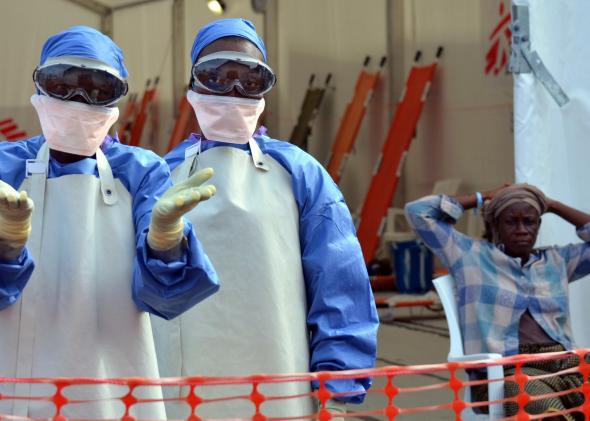The politically heated debate over how to contain the Ebola virus in the United States is mostly a sideshow to the much more important question of how to contain the outbreak in West Africa. Without a cure, the only way to stop the disease is to break chains of infection. Thankfully, most countries where the disease has been introduced have had relatively few chains to break. That’s a big reason why Nigeria, despite some early missteps, was eventually able to contain it and why the United States, despite its own public health screw-ups, will most likely be able to do so as well. But as long as thousands are still sick in Guinea, Liberia, and Sierra Leone, the number of chains will continue to grow and—in a globalized economy—more sick people will continue to travel to more countries.
This is one big reason why quarantine measures that discourage health workers from traveling to West Africa are so short-sighted. The only way to keep the U.S.—and every other country, for that matter—safe from Ebola, is to stop it at its source. And that, as Paul Farmer puts it, will require a lot more “staff, stuff, space, and systems.”
Recently, though, there have been some cautiously optimistic reports that the tide may be turning in one of Ebola’s epicenters. Local reports suggest that there have been fewer new infections and fewer deaths from Ebola in Liberia than in August and September.
Public health researcher Helen Epstein writes for the New York Review of Books:
In August, the streets of Monrovia were strewn with bodies and emergency Ebola clinics were turning away patients. Today, nearly half of the beds in those treatment units are empty. I’ve been here a week and have yet to see a single body in the street. Funeral directors say business is off by half.
Northern Lofa County, which borders Sierra Leone and was one of the hardest-hit areas, has seen three consecutive weeks of declines in the number of cases observed, according to the WHO.
As Jina Moore, reporting from Liberia for Buzzfeed, notes, the promising news is tempered somewhat by the fact that there aren’t very good numbers available on how many people had Ebola in Liberia to begin with, making it difficult to get more than an anecdotal sense of whether the disease is on the decline.
It’s also possible that some patients are being hidden from healthcare workers by their families. But Epstein points out some evidence that Liberians are better informed about the dangers of the disease than they were in the early days of the outbreak. “In Monrovia, health workers travel from house to house in the slums checking on people who had contact with those who are already sick or have died,” she writes. “In July, nearly half of those contacts went on to succumb to the disease themselves. Today, fewer than 20 percent of them do.”
All the same, we’re far from out of the woods in the fight against the disease that has already killed in the neighborhood of 5,000 people around the world. There have been no similar reports of drops in the other countries affected by Ebola. In fact, the number of cases has risen sharply in Western Sierra Leone this month. The disease also may have spread to yet another country—82 people in Mali who came in contact with a toddler who died of Ebola last week are currently being monitored for signs of the disease. The collateral damage from the outbreak—including the impact on the economies and political institutions of some of the world’s most fragile states and the setback in the fight against diseases like malaria—will continue to mount.
As Epstein writes, it “seems that this simple set of interventions, which has worked in the past to contain 25 previous known Ebola outbreaks in Africa since 1976, is belatedly working [in Liberia] too.” Let’s hope she’s right. Let’s also hope that the political conversation in developed countries around this disease shifts toward measures that could actually do something to stop it.
